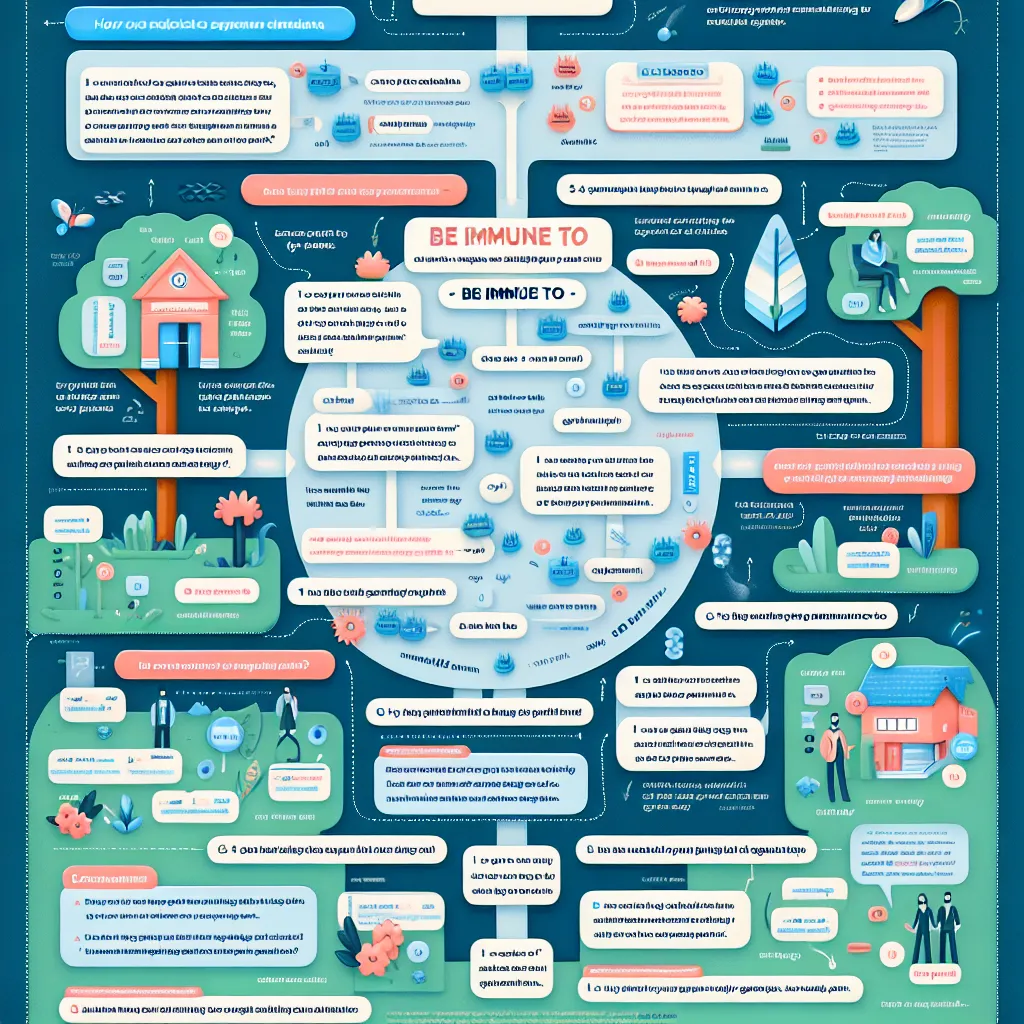The phrase “be immune to + noun/gerund” is a powerful and versatile structure that can significantly enhance your IELTS performance. This expression is commonly used in both academic and general contexts, making it particularly valuable for IELTS candidates aiming to demonstrate a sophisticated command of English. Let’s delve into the intricacies of this structure and explore how you can effectively incorporate it into your IELTS preparations.
Understanding the “Be Immune to + Noun/Gerund” Structure
The phrase “be immune to” essentially means to be unaffected by or resistant to something. When followed by a noun or gerund, it creates a structure that expresses an inability to be influenced or harmed by a particular thing or action.
Formula: Subject + be + immune + to + noun/gerund
Examples:
- Scientists are immune to pressure from politicians.
- Her confidence seems to be immune to criticism.
- Some people appear to be immune to getting sick during flu season.
In these examples, the subjects (scientists, her confidence, some people) are described as being unaffected by or resistant to the nouns or gerunds that follow (pressure, criticism, getting sick).

Applying “Be Immune to” in IELTS Writing
Task 2 Essay Writing
Incorporating this structure into your IELTS Writing Task 2 essays can elevate your language proficiency and help you achieve a higher band score. Here’s an example of how you might use it in an essay about technology and social interaction:
“While some argue that technology has made us more connected, it seems that many people have become immune to the need for face-to-face communication. This immunity to personal interaction is particularly evident among younger generations, who often prefer digital messaging to real-world conversations.”
In this passage, the phrase is used twice to emphasize the idea that people are becoming resistant to traditional forms of communication. This sophisticated use of language can contribute to a higher score in the Lexical Resource and Grammatical Range criteria.
Task 1 Report Writing
Although less common in Task 1 responses, the “be immune to” structure can still be effectively used in certain contexts, particularly when describing trends that resist change:
“Despite fluctuations in other sectors, the technology industry appears to be immune to economic downturns, showing consistent growth throughout the period.”
This usage demonstrates an advanced ability to interpret and describe data, potentially boosting your Task Achievement and Coherence and Cohesion scores.
Enhancing IELTS Speaking Performance
The “be immune to” structure can also add sophistication to your spoken English, particularly in Parts 2 and 3 of the IELTS Speaking test.
Speaking Part 2 Example
Topic: Describe a person you know who is very determined.
“I’d like to talk about my friend Sarah, who is one of the most determined people I know. What’s remarkable about her is that she seems to be immune to discouragement. No matter how many setbacks she faces, she always bounces back with even more determination. This immunity to negativity is what sets her apart and has led to her success in both her personal and professional life.”
Speaking Part 3 Example
Question: Do you think some people are naturally more determined than others?
“While I believe that determination can be cultivated, I’ve observed that some individuals do seem to be naturally immune to giving up. These people appear to have an innate resilience that allows them to persist in the face of challenges that might deter others. However, I also think that this ‘immunity to defeat’ can be developed over time through practice and positive reinforcement.”
In both examples, the use of “be immune to” adds a layer of sophistication to the responses, potentially contributing to higher scores in the Lexical Resource and Grammatical Range and Accuracy criteria.
Common Mistakes and How to Avoid Them
When using the “be immune to” structure, IELTS candidates should be aware of several common pitfalls:
-
Incorrect preposition: Using “from” instead of “to” (e.g., “immune from criticism” instead of “immune to criticism”).
Correct: She is immune to flattery.
Incorrect: She is immune from flattery. -
Mixing up “immune” and “immunize”: Remember that “immune” is an adjective, while “immunize” is a verb.
Correct: The population was immune to the virus.
Incorrect: The population was immunize to the virus. -
Using a verb instead of a gerund: When an action follows “immune to,” it should be in the gerund form.
Correct: He seems immune to getting stressed.
Incorrect: He seems immune to get stressed. -
Overuse: While this structure can enhance your language, using it too frequently can seem unnatural.
Natural: She’s immune to criticism and resilient in the face of challenges.
Overused: She’s immune to criticism, immune to failure, and immune to discouragement.
By avoiding these mistakes, you can ensure that your use of “be immune to” enhances rather than detracts from your IELTS performance.
Strategies for Mastering “Be Immune to”
To effectively incorporate this structure into your IELTS repertoire:
-
Practice with various nouns and gerunds: Try combining “be immune to” with different words to expand your range (e.g., immune to change, immune to persuasion, immune to feeling cold).
-
Use it in context: Create sentences or short paragraphs using the structure in relevant IELTS topics (environment, education, technology, etc.).
-
Vary your sentence structures: Combine “be immune to” with other advanced structures to demonstrate linguistic flexibility.
-
Listen for examples: Pay attention to how this phrase is used in English-language media to understand its nuances.
-
Incorporate synonyms: Learn related expressions like “resistant to,” “unaffected by,” or “impervious to” to avoid repetition.
Conclusion
Mastering the “be immune to + noun/gerund” structure can significantly enhance your IELTS performance across all sections of the test. By understanding its usage, avoiding common mistakes, and practicing its application in various contexts, you can demonstrate a sophisticated command of English that may contribute to achieving a higher band score. Remember to use this structure judiciously and in combination with other advanced language features to create a well-rounded and impressive linguistic performance in your IELTS exam.